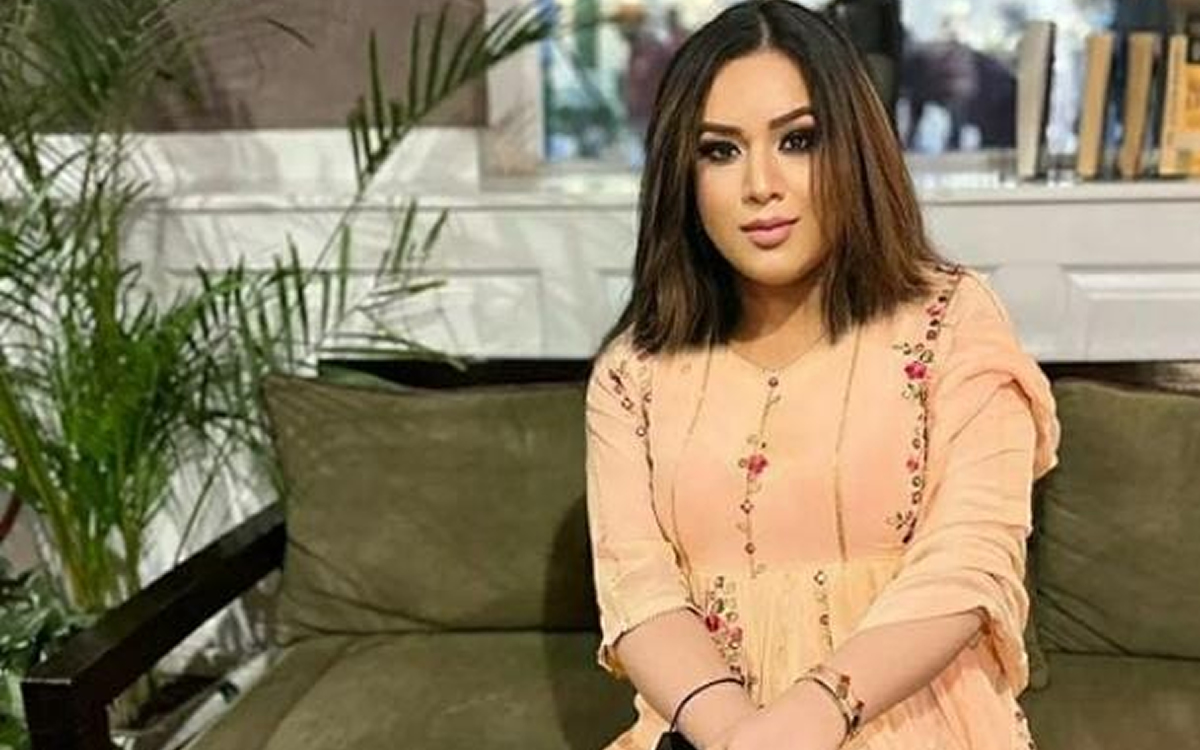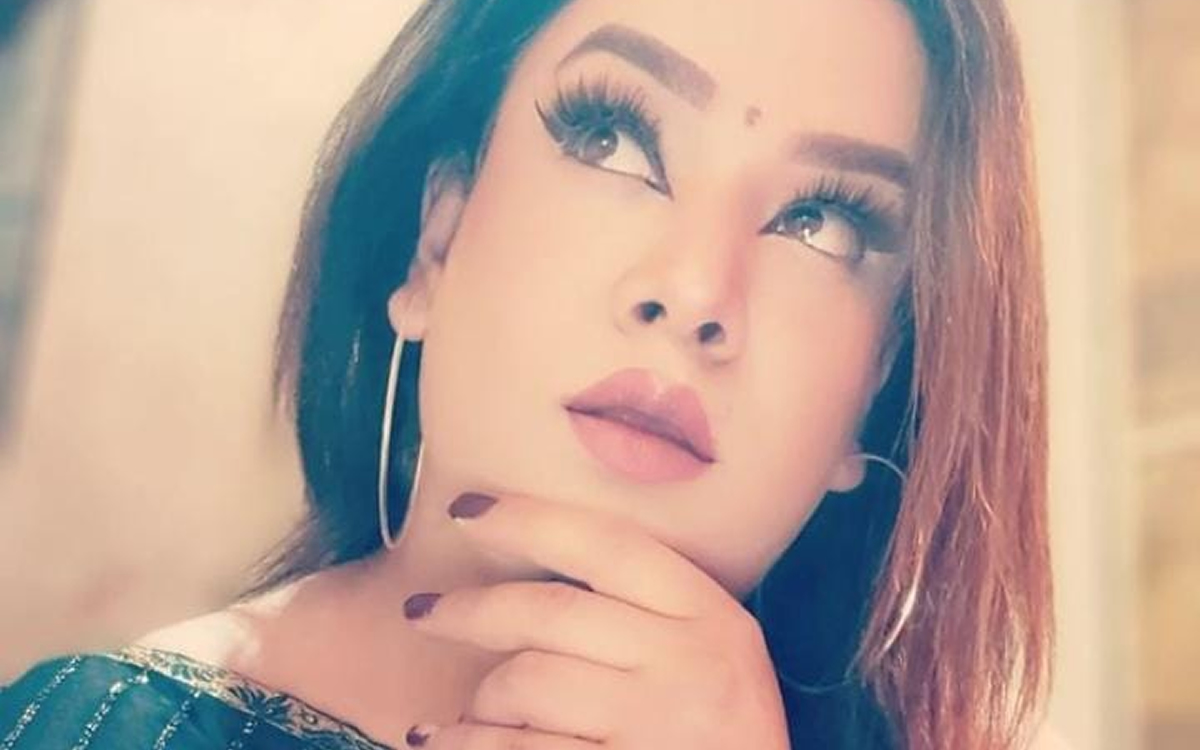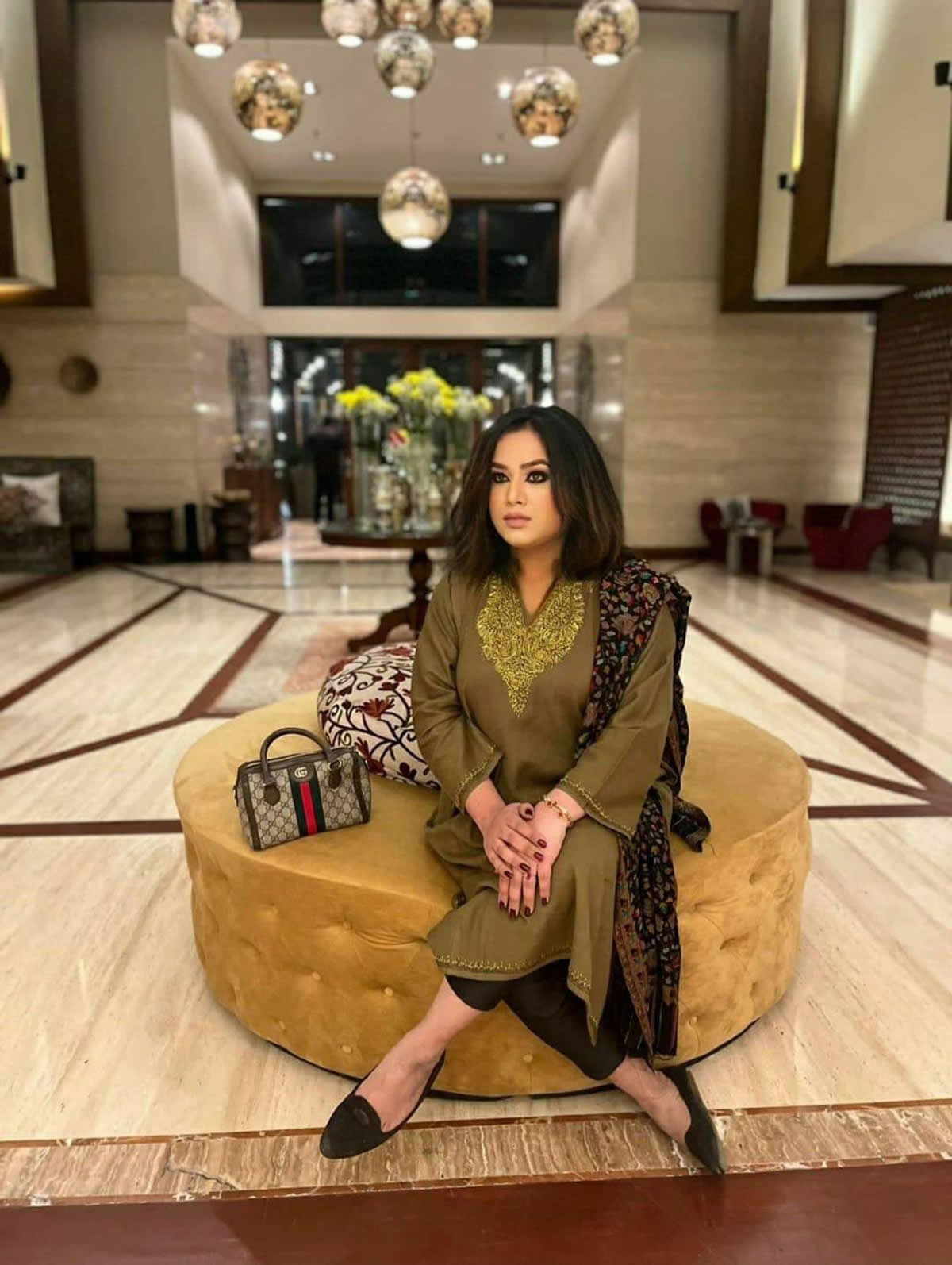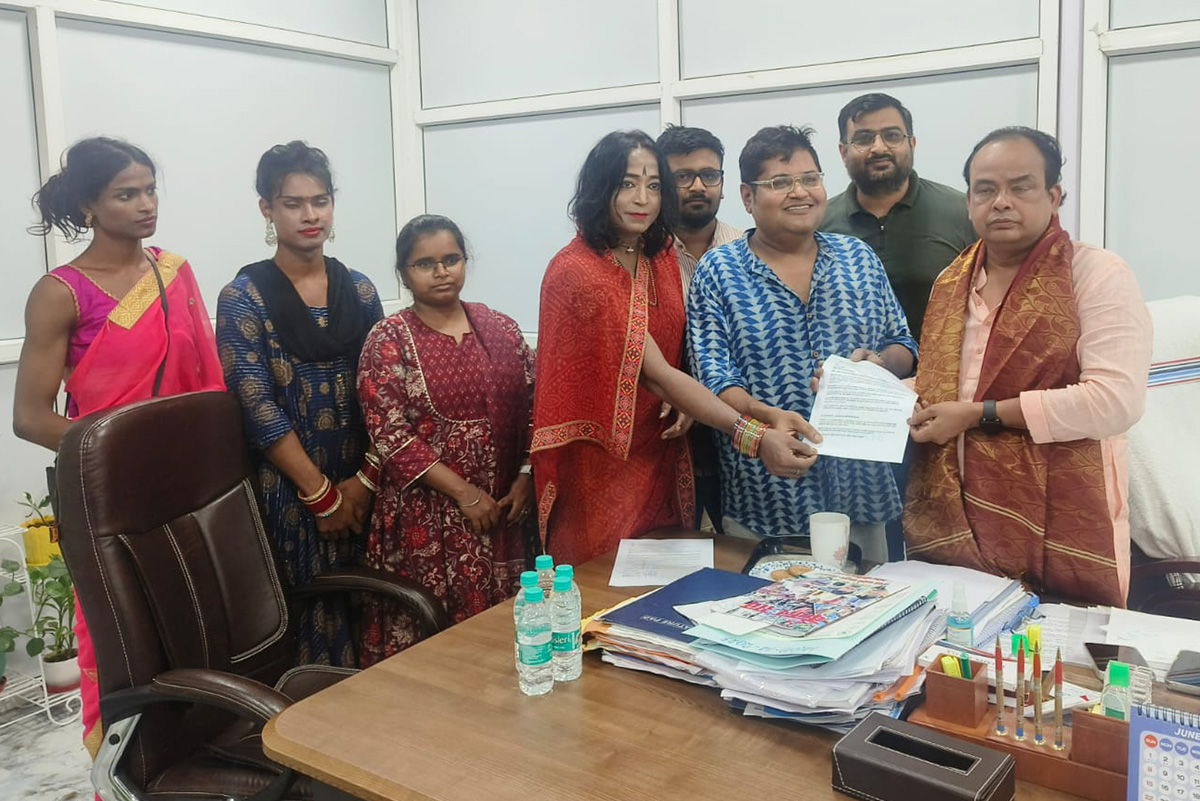India
Transgender woman from Kashmir makes her mark
Shoaib Khan has been in corporate India for 11 years

Kashmir, the crown of India, the world’s largest democracy, has been the center of the flourishing of Hinduism, Islam, Buddhism and other religions.
The transgender community since ancient times has had cultural roots in every state in India, including Kashmir, but a conservative society did not let the community spread its wings properly. Breaking all odds, Shoaib Khan finished her studies and became the first trans person from Kashmir to work in India’s corporate world.
Khan is a person who believes that people do not come out, but they feel the same from childhood. Her journey was never to come out, but she felt the same from her childhood.
“I was dependent on people, like my family, for lots of things,” said Khan. “When I got the ability to stand by myself, when I was independent, I started behaving the way I wanted to and I started accepting the way I was from my childhood.”
Before the India Supreme Court’s historic ruling that struck down Section 377, a colonial-era law that criminalized consensual same-sex sexual relations in the country, talking about trans people was a taboo topic for many.
Khan told the Washington Blade it was difficult to come out because trans people face ridicule and bullying. She believed that if one can have determination and confidence, the world starts to adjust and accept.
Khan also believes that family plays an important role, but her family’s reaction was not good when she told them about herself. Khan told the Blade that since the family knows their own from childhood, it was not a surprise for them. She stood her ground, and she is still fighting for her rights in her social circle.
Through the Blade, Khan wants to encourage other families anywhere in the world to support their kids if they are from the LGBTQ and intersex community.
“At least do not deprive them of their basic human rights,” said Khan. “Try to educate them, and if they gets any opportunity then these people will excel in multiple fields.”
As a trans person, Khan’s journey to get an education was not easy.
She faced humiliation, harassment and mental torture. When Khan was in seventh grade, someone bullied her, and when she went back home, she cried and counted the remaining days of school.
“I counted days that how many days I have to go to school to face this humiliation till 10th standard,” said Khan, while talking about her childhood. “The journey was not easy.”
Khan said society has a major role to play to make the lives of trans people easy. She urged her community to stay strong and connect to excel in life where they are accepted.

Khan has completed her bachelor’s in commerce and master’s in business administration with a specialization in human resources. She is currently working with a corporation in India.
While talking with the Blade, Khan said that India’s trans community is facing a lot of discrimination, not only in Kashmir but around the country. Khan believes discrimination is present because of the lack of awareness about the community, but at the same time she believes the community is seeing improvements.
“Before decriminalization of homosexuality, there was no option to choose for gender other than male or female, but now if you go to the Aadhaar link (India’s biometric ID card,) you have the option to choose between male, female and others,” said Khan. “This is a great example in that our country is leading the improvements. Our country is behaving democratically, where people have the right to choose what they are.”
Khan suggested the government should spread awareness about gender identity so that people know it is natural and people do not choose it.
While talking with the Blade, Khan thanked close friends and family who supported her throughout her journey. She said that many people have supported her, but some close ones made her competent enough to fight her way to where she is at.
“I would like to thank them for their unconditional love and support,” said Khan. “They will be happy to see my work published, where I am talking about rights and standing for my community. That is a big achievement.”
‘Journey is not easy’
Khan has worked in the corporate world for 11 years.
She began her career in the airline industry before she entered the corporate sector. Khan said her experience in the airline industry was not as good as she expected because there was no sensitization about gender. She said corporate policies are not bad, but people should be sensitized before introducing someone from the LGBTQ community.
While talking about her previous experience, she said she was subjected to some harassment and humiliation. Although she raised her voice and actions were taken at the time, Khan said her current corporate journey has gone well, and she feels satisfied.
She said other members of the LGBTQ and intersex community feel proud of what she has accomplished, and they say she is their representative from Kashmir.
“The journey is not easy,” said Khan. “You can look on to the lives of where people from trans community or LGBTQ community have achieved success. Because they did not put themselves in a confined zone where they are subjected to humiliation only. So, they concentrated on education. I would like to give an important message to my community that you need to be educated, you need to have a light in your eyes, and where you can differentiate between right and wrong.”

Ankush Kumar is a reporter who has covered many stories for Washington and Los Angeles Blades from Iran, India and Singapore. He recently reported for the Daily Beast. He can be reached at [email protected]. He is on Twitter at @mohitkopinion.
India
Few transgender people benefit from India’s low-income housing program
Pradhan Mantri Awas Yojana launched in 2015

The Indian government on Dec. 15 informed parliament that only one transgender person in Jammu and Kashmir has been recorded as a beneficiary under the Pradhan Mantri Awas Yojana since the housing program was launched a decade ago.
PMAY is a federal government program aimed at expanding access to affordable housing for low- and middle-income households, including through credit-linked subsidies. The parliamentary disclosure indicates that trans beneficiaries have been virtually absent from the program’s records in the union territory, despite official guidelines listing trans people as a priority category.
In a written reply to a question in the upper house of parliament, known as the Rajya Sabha, the Housing and Urban Affairs Ministry said Jammu and Kashmir recorded zero trans beneficiaries under the program in each financial year from 2020–2021 through 2025–2026, with the cumulative total since inception remaining at one.
The Indian government launched the program on June 25, 2015, and the Housing and Urban Affairs Ministry implemented it.
The parliamentary reply came in response to a question on whether trans people are being included under the housing scheme and what steps have been taken to address barriers to access. The ministry said both PMAY and its successor, PMAY 2.0, are demand-driven programs, with responsibility for identifying and selecting beneficiaries resting with state and regional governments.
The ministry said the program lists trans people as a priority group, alongside widows, single women, people with disabilities, senior citizens, and other socially disadvantaged categories. It added that actual implementation depends on housing proposals and beneficiary lists submitted by state and regional governments.
According to figures the Indian government cited, a total of 809 trans beneficiaries have been recorded under PMAY and its successor, PMAY 2.0, since the programs were launched, with the vast majority concentrated in a small number of states. The southern state of Tamil Nadu accounts for 222 beneficiaries, followed by Andhra Pradesh with 186, and Odisha with 101. By contrast, several other states and federally administered regions, including Jammu and Kashmir, have reported either negligible or no coverage. India is administratively divided into 28 states and eight federally governed territories.
According to India’s 2011 national Census, Jammu and Kashmir recorded 4,137 trans residents. The same census counted 487,803 trans people nationwide, providing the most recent official population baseline for the community in India.
The ministry also said it has not conducted a specific survey to assess barriers faced by trans communities in accessing the scheme’s benefits. Instead, it said lessons from earlier implementation phases informed the design of the second phase of the program, launched on Sept. 1, 2024, which aims to support an additional 10 million urban beneficiaries over the next five years.
The parliamentary reply reveals an even more severe gap in Ladakh, India’s northernmost federally governed territory bordering China and Pakistan-administered areas and considered strategically critical to national security.
Official records show that Ladakh has not reported a single trans beneficiary under the housing scheme, either in recent years or cumulatively since the program began, with zero coverage recorded across all financial years listed in the Annexure. By comparison, Ladakh’s trans population stands at six, according to a written submission made to the High Court of Jammu and Kashmir in 2024.
Despite trans people being listed as a priority group in the scheme’s guidelines, the federal government said that as of November 2025 it had sanctioned more than 12.2 million homes nationwide under both versions of the program, with over 9.6 million homes completed and delivered. At the same time, data from Jammu and Kashmir, Ladakh, and several other regions show little to no recorded housing uptake by trans beneficiaries.
Speaking with the Washington Blade, Meera Parida, a trans activist, former member of the National Council for Transgender Persons in India’s eastern zone, and a former state advisor under the housing and urban development department, said the 2011 Census does not reflect the full size of India’s trans population, noting that public recognition and self-identification were far more limited at the time. She pointed to later government data collection efforts, including the National Portal for Transgender Persons that the Social Justice and Empowerment Ministry launched in 2020, as evidence that official counts have expanded beyond what was captured in the last Census.
“I am surprised that around the country only over 800 people benefited from the scheme, because most of the transgender population is from socially backward classes,” said Parida. “So they do not have a house and no family. Five years have passed since the NALSA judgment and the Transgender Protection Act; even after all these, if only over 800 transgender persons got home, that is a sad situation.”
Parida said that Prime Minister Narendra Modi has publicly positioned trans people’s welfare as a priority, but argued that the issue requires greater attention at the administrative level. She said the prime minister’s office should issue clear directions to all relevant departments to ensure trans people receive housing support and that implementation moves more quickly.
“There is still widespread discrimination and stigma against the community. Many transgender people are afraid to speak openly, which is why this issue continues to persist,” Parida said. “If stigma and discrimination are not addressed seriously, the marginalized community will remain invisible and reluctant to come forward. In that situation, the government will also be limited in what it can do. State governments should work with activists and community organizations to build accurate data. The government has decided to resume the Census in 2026, but the enumerators who go door to door must be sensitized to engage respectfully with the transgender community. The government should also improve awareness of housing schemes, because many people simply do not know they exist. A single-window system is needed.”
India
India’s Jharkhand state works to improve trans people’s access to health care
People for Change working with local officials to address disparities

The transgender community has been part of India’s social fabric for centuries, but decades of policy neglect pushed many into poverty and inadequate health care.
The Supreme Court formally recognized trans people as a third gender in 2014, yet state-level services developed slowly. Telangana opened India’s first dedicated trans clinic, the Mitr Clinic, in 2021 with support from the U.S. Agency for International Development and Johns Hopkins University. Jharkhand State has now ordered all government hospitals and medical colleges to establish dedicated outpatient units for transgender patients.
People for Change, an LGBTQ organization, spent the past year mapping gaps in trans health care across Jharkhand. Its surveys of 100 trans residents in five districts found limited access to gender-affirming care, hormone therapy, dermatology, and mental-health services. The group followed this survey with a May 2025 consultation in Jamshedpur, an industrial town in Jharkhand, that brought together clinicians and community leaders to outline a feasible outpatient model.
Those findings were presented to Health Minister Irfan Ansari in June, backed by input from allied organizations and more than 50 trans leaders. The process helped inform the state’s decision to introduce dedicated trans outpatient departments in all government hospitals and medical colleges.
People for Change, which played a central role in shaping the policy, noted that government hospitals in Jharkhand still face infrastructure and resource gaps. Even so, the group said the order reflects a clear policy commitment to creating dedicated trans health services.
If Jharkhand’s trans outpatient departments system functions as planned, it could become a regional model for states with comparable gaps in public health access.
Government data from the 2011 Census — the latest official count to identify an “other” gender category — lists 13,463 trans residents in Jharkhand, alongside sizable populations in neighboring states: 40,827 in Bihar, 30,349 in West Bengal, 22,364 in Odisha, 18,489 in Chhattisgarh, and 137,465 in Uttar Pradesh. Though likely underreported, these figures underscore the scale of need across eastern and central India.
“The decision to start dedicated transgender OPDs (outpatient departments) is not just an administrative step — it is a statement of inclusion, a recognition that the transgender community deserves discrimination-free, dignified, and responsive healthcare. When the government takes such a deliberate step, it sets a tone for systemic change,” said Souvik Saha, founder of People for Change. “It creates an official entry point for transgender healthcare.”
“For the first time, transgender persons will have a recognized and respectful space within the public health system,” added Saha. “That itself is a major shift. It signals to doctors, nurses, and administrators that transgender health is a priority. This leads to sensitization, accountability, and the gradual improvement of attitudes within hospitals.”
Saha told the Washington Blade the policy is likely to trigger broader improvements, noting that once a service is formally notified, budget allocations, training, infrastructure, and staffing typically follow. He said the move could strengthen the system gradually, “step by step.”
“We are realistic: we know improvements won’t happen overnight. But we are also optimistic because the state has already shown genuine leadership and empathy by issuing this order,” said Saha. “And since Jharkhand is celebrating its 25th year of formation, this decision reflects the state’s intention to move towards greater equality and social justice.”
“For the transgender community, this is not just a service — it is dignity. It is visibility. It is inclusion,” he added. “And with the government, civil society, and community working together, we believe this will lead to meaningful and lasting change in the years ahead.”
Saha told the Blade that the dedicated transgender outpatient will operate within existing government medical colleges and hospitals in Jharkhand and will be staffed by current medical and paramedical teams, with no separate funding required at this stage. He said the policy does not call for separate wards or beds, but for clearly designated outpatient spaces for trans patients. The service, he added, will be run by existing staff who will receive training and orientation as needed.
“At this moment, the specific operational details are still being discussed with the government of Jharkhand. However, what is clear is: the OPD will function as a dedicated space within the hospital, not limited to a specific day,” said Saha. “Transgender individuals will have access to focused, discrimination-free services through this dedicated space. The clinic will run through existing hospital systems, with linkages to psychiatry, dermatology, endocrinology, and other departments when required.”
“This structure allows the government to start services immediately without needing new construction, new staff positions, or separate budget lines,” he added. “It is a practical and efficient first step, making the service accessible while keeping the doors open for: future budget allocations, specialized staffing, expansions into gender-affirming services, and strengthened infrastructure. The government’s intent is very clear: to ensure dignified, equitable, and discrimination-free healthcare for the transgender community. This order is a strong beginning, and operational details will continue to evolve through collaborative discussions between the government, hospitals, and People for Change.”
Saha acknowledged that taboos, misinformation, and stereotypes about the trans community persist in Jharkhand and in many other states. However, Saha said there are encouraging models at which to look.
He pointed to Kerala and Chhattisgarh, which have introduced sensitization programs and begun integrating trans-inclusive practices into their public health systems. These examples, he noted, show that when health departments invest in training and awareness, attitudes shift and services become more respectful and accessible.
“In Jharkhand, People for Change has proposed a similar approach. We have formally recommended to the government that civil surgeons, chief medical officer, doctors, nurses, and other hospital staff be trained on gender sensitization and transgender health challenges. This includes understanding gender identity, psychological needs, respectful communication, medical protocols, and ways to ensure discrimination-free services,” said Saha. “The encouraging part is that these proposals are already being discussed in detail with the government of Jharkhand. The government has shown strong intent through the issuance of the transgender OPD order, and training health professionals is naturally the next crucial step.”
Saha noted that it remains unclear whether trans people will be recruited into government health roles, saying it is too early to make any definitive statement. He explained that recruitment requires separate processes, policies, and approvals, and the current order does not address new staffing or the creation of government positions.
A recent performance audit by the Comptroller and Auditor General of India, the constitutional authority responsible for auditing government spending and administration, outlined severe human-resource and medicine shortages across Jharkhand’s public health system.
Tabled in the state assembly in February, the report found that about 61 percent of sanctioned posts for medical officers and specialists were vacant, along with more than half of all staff-nurse positions and roughly four-fifths of paramedic posts. The audit also documented acute shortages of essential drugs in the hospitals it reviewed, with stock gaps ranging from 65 to 95 percent during the 2020-2022 period. The findings highlight the systemic constraints that the new trans outpatients will have to navigate.
Saha acknowledged that drug shortages remain a serious issue in government hospitals and said the concern is valid. Even so, he added that he is approaching the new outpatient policy with hope and confidence.
“The government of Jharkhand has made a historic and intentional decision by opening dedicated transgender OPDs,” said Saha. “When a government takes such a strong step of recognition and inclusion, it also shows the readiness to understand the specific health challenges and medication needs of the transgender community.”
“As more transgender persons start coming to the OPDs and their health requirements become clearer through proper documentation and reporting, we are confident that the state will make every effort to ensure that essential medicines are available for them,” he added.
Saha said People for Change is also seeking support outside the public system. The organization has begun briefing civic service groups — including Lions Club, Rotary Club and Inner Wheel, international volunteer organizations that run local welfare and health projects — on the outpatient order and the community’s needs. According to Saha, several of these groups have indicated they may help trans patients with medicines and other essentials when prescribed by a doctor.
“So the effort is two-fold: the government is creating an inclusive health system and will be informed of the community’s specific medicinal needs through the OPDs. People for Change and partners are strengthening the safety net to ensure that transgender persons are never left unsupported,” said Saha. “We truly believe that this collaborative approach will ensure that transgender individuals receive the medication and care they deserve — with dignity, consistency, and compassion.”
“Every hospital may take a slightly different amount of time depending on internal readiness, but overall: The foundational work is already underway, Hospitals have started preparing their designated OPD spaces, And coordination is happening at the level of civil surgeons, medical superintendents, and hospital management teams,” he added.

A same-sex couple on Aug. 14 petitioned the Bombay High Court to consider their challenge of provisions of India’s Income Tax Act that only exempt gifts between heterosexual spouses from taxation.
Section 56(2)(x) of the Income Tax Act states any money, property, or asset received without adequate consideration that exceeds 50,000 rupees ($570.96) is taxed as “income from other sources.”
An exception in the fifth provision exempts such gifts when received from “relatives,” a category that includes “spouses.” The law, however, does not provide a separate definition of the term “spouse.”
The petitioners have asked the court to declare the use of the term “spouse” in Section 56(2)(x) unconstitutional, arguing its application effectively excludes same-sex couples from the exemption.
The Bombay High Court has issued notice to the attorney general of India, the country’s top law officer, on the petition.
The petitioners, represented by lawyers Dhruv Janssen-Sanghavi, Tejas Popat, Vishesh Malviya, Amandeep Mehta, and Aanchal Maheshwari, argue that denying them the exemption available to heterosexual spouses amounts to discrimination.
“While not entering into the merits at this stage,” observed Justices BP Colabawalla and Firdosh P. Pooniwalla on Aug. 14. “Since the constitutional validity is challenged, we issue notice to the attorney general of India returnable on Sept. 18, 2025. We also direct the registry to issue notice to Respondent No. 2, returnable on Sept. 18, 2025.”
The petitioners told the court that the current framework violates their fundamental rights under Articles 14, 15, and 21 of the Indian constitution, which guarantee equality under the law, prohibit discrimination on grounds including sex, and protect the right to life and personal liberty.
“The Writ Petition is filed to declare and hold that the term ‘spouse’ appearing in the explanation to the fifth proviso to Section 56(2)(x) an unconstitutional inasmuch as it excludes the Petitioners from the scope and definition of the term ‘spouse.'” said the judges. “The declaration is also sought to extend the benefit of the fifth proviso to Section 56(2)(x) of the IT Act to the petitioners who are in a long-term, stable same-sex relationship.”
The judges, as an alternative noted the petition seeks an interpretation of the term “spouse” in Section 56(2)(x) that would extend the exemption to same-sex couples, whom the petitioners argue are in the same position as heterosexual couples presumed to be in a marriage.
The case is scheduled for hearing on Sept. 18, when the attorney general and the Indian government are expected to file their responses.
“Johar judgment of Sept. 6, 2018 gave us the right to love without fear,” said Harish Iyer, a prominent LGBTQ activist in India. “But what good is love if Lady Justice stays blindfolded to our families of choice — beyond gender boxes, beyond marriage certificates.”
Speaking to the Washington Blade, Iyer said the community’s legal journey has been a lifeline rather than a mere timeline, citing milestones such as the Naz Foundation ruling on decriminalization, the NALSA judgment on transgender rights, the Supreme Court’s decision in Navtej Singh Johar, and the affirmation in Puttaswamy that privacy is intrinsic to dignity.
He stressed each ruling represented a moment of recognition and argued that rights for queer people are not passively granted but continuously upheld in courtrooms, newsrooms, boardrooms, and ballot boxes, requiring constant defense.
“Our fight for our rights is our lifelong resistance,” said Iyer. “Rights are not a given, they are a continuous defense — against erasure, against silence, against the comfort of forgetting. The Puttaswamy judgment reminded us that privacy is not a privilege, but a constitutional promise; and in that promise lives the freedom to love, to live, and to be.”
In response to a question about the impact on the community, Iyer told the Blade the struggle remains exhausting, with constant pressure weighing on both mental health and financial stability. At the same time, he noted a shift, with more voices speaking up and more people joining the fight. Iyer emphasized the Pride flag has been firmly raised and will not be lowered, underscoring the community’s resolve not to back down.
The Supreme Court, in its 2023 ruling that declined to extend marriage rights to same-sex couples, urged the government to create a committee to examine what measures could be taken to extend economic benefits currently available only to heterosexual couples. The court recommended the panel consider access to entitlements — joint bank accounts, pensions, succession rights, and health insurance — so queer couples are not excluded solely because their relationships lack legal recognition.
Ankit Bhupatani, a global DEI leader and LGBTQ activist, said the petition before the Bombay High Court is not only about taxation; but also about dignity, equality, and the need to dismantle systemic discrimination. He noted that this represents precisely the kind of legislative gap the Supreme Court had pointed out during the marriage equality hearing — heterosexual couples are protected while queer couples remain vulnerable.
“This reflects the gap between constitutional morality and statutory reforms. While the Supreme Court in Navtej Johar (2018) declared that LGBTQ persons are equal citizens, and in the marriage equality case acknowledged our hardships, the implementation of those declarations depends on proactive steps by the legislature and the executive. Unfortunately, successive governments have failed to do this work,” said Bhupatani. “It is unfair and exhausting for the community to repeatedly prove our humanity in courts just to access basic rights that heterosexual couples take for granted. Equality cannot be piecemeal; it must be comprehensive.”
Bhupatani further said that the impact is two-fold: emotional and material.
On the one hand, such discriminatory laws send a message that same-sex love is “less than,” that same-sex relationships are legally invisible. This, he said, takes a toll on mental health and reinforces stigma in society. On the other hand, the financial burden is very real, as many queer couples face unfair taxation, denial of joint benefits, and lack of recognition in matters of property, pensions, and inheritance.
“These are not abstract issues, they affect whether couples can plan their future together, buy a home, or provide for one another in old age,” said Bhupatani. “When the law penalizes queer families, it perpetuates inequality and economic hardship. This case, therefore, is not just about taxes, it is about affirming that queer Indians deserve the same dignity, rights, and protections as anyone else under the constitution.”
-

 Florida5 days ago
Florida5 days agoAIDS Healthcare Foundation sues Fla. over ‘illegal’ HIV drug program cuts
-

 Arts & Entertainment5 days ago
Arts & Entertainment5 days agoCatherine O’Hara, ‘Schitt’s Creek’ star and celebrated queer ally, dies at 71
-

 Calendar5 days ago
Calendar5 days agoCalendar: January 30-February 5
-

 Out & About4 days ago
Out & About4 days agoThis queer comedy show will warm you up

















